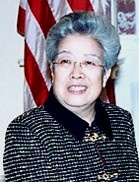Wu Yi (politician) facts for kids
|
||||||||||||||||||||||||||||||||||||||||||||||||||||||||||||||||
Wu Yi, born in November 1938, is a Chinese politician who is now retired. She served as a Vice Premier of China from 2003 to 2008. During the early 2000s, she was one of China's most well-known leaders.
She became famous for taking on the role of Minister of Health in April 2003. This happened during the SARS outbreak, soon after she became Vice Premier. Wu Yi was also a member of the Politburo, a very important group in the Chinese Communist Party. She was often called the "iron lady" by Chinese media. She was known for being a strong negotiator in international talks.
Contents
Early Life and Education
Wu Yi was born in November 1938 in Wuhan, China. She came from a family of intellectuals. Her family's roots are in Huangmei County in Hubei province. She was the younger of two children.
Her parents passed away when she was young. Her older brother, who was eight years older, raised her. In April 1962, she joined the Chinese Communist Party. In August of the same year, she finished her studies. She graduated from the Beijing Petroleum Institute. She earned a degree in petroleum engineering.
Early Career in Petroleum
Wu Yi spent much of her early career as a petroleum technician. She worked her way up in the industry. She became a deputy manager at the Beijing Dongfang Hong refinery. Later, she was an assistant manager and party secretary at the Beijing Yanshan Petrochemical Corporation.
Political Career and Leadership
Wu Yi began her political career in Beijing. She was elected deputy mayor of Beijing in 1988. She held this position until 1991. After a difficult event in 1989, she helped persuade coal workers to continue their work.
From 1991 to 1998, she held several important roles. She was Deputy Minister of Foreign Economic Relations and Trade. Then she became Minister of Foreign Trade and Economic Co-operation. She was also a member of the 14th and 15th Central Committees.
Rising to National Leadership
Wu Yi was a trusted colleague of Zhu Rongji. She became a State Councilor in 1998. In March 2003, she was appointed Vice Premier. This was part of the Wen Jiabao government.
She was the first woman to hold this high position. This happened since China's economic reforms began in 1978. Many considered her the most powerful woman in Chinese politics since Mao's wife, Jiang Qing. She played a key role in China joining the World Trade Organization. She also helped improve the customs service. This was after concerns from the U.S. about intellectual property rights.
Leading During the SARS Crisis
During the SARS health crisis, Wu Yi took on a critical role. She replaced the previous health minister, Zhang Wenkang. He had been removed from his position. Wu Yi then led a special committee to manage the crisis.
She received international praise for her leadership. Time magazine called her the "Goddess of Transparency." This was for her clear and open handling of the SARS crisis. She was also named one of the Time 100 Most Influential People in 2004.
Later Years in Government
In early 2007, another senior Vice Premier, Huang Ju, became ill. Wu Yi took over his duties in the financial sector. After Huang Ju passed away in June 2007, Wu Yi became the most senior-ranked Vice Premier.
Also in 2007, a new committee was formed. It was created to oversee the quality of consumer goods and food safety. Wu Yi was chosen to lead this important committee. There was some talk that she might continue working past the usual retirement age of 68.
Retirement from Public Life
At the 17th National Congress of the Chinese Communist Party, Wu Yi was not named to the new Politburo. A month later, she spoke about her future. She said she planned to "retire completely." She stated she would not take any official or semi-official roles. She also mentioned that she wanted people to simply forget about her.
In her final months in office, she was involved in talks with the U.S. toy company Mattel. These discussions were about lead content in toys. This issue had affected the reputation of products made in China. In early 2008, Wu Yi shared her personal salary with Chinese business leaders. She said it was about 120,000 yuan, or around $17,600 per year at that time. She advised them to "take money from the right places."
Wu Yi officially retired from politics in March 2008. She stepped down as Vice Premier.
Images for kids
-
Wu Yi with US Secretary of State Colin Powell
See also
 In Spanish: Wu Yi para niños
In Spanish: Wu Yi para niños



